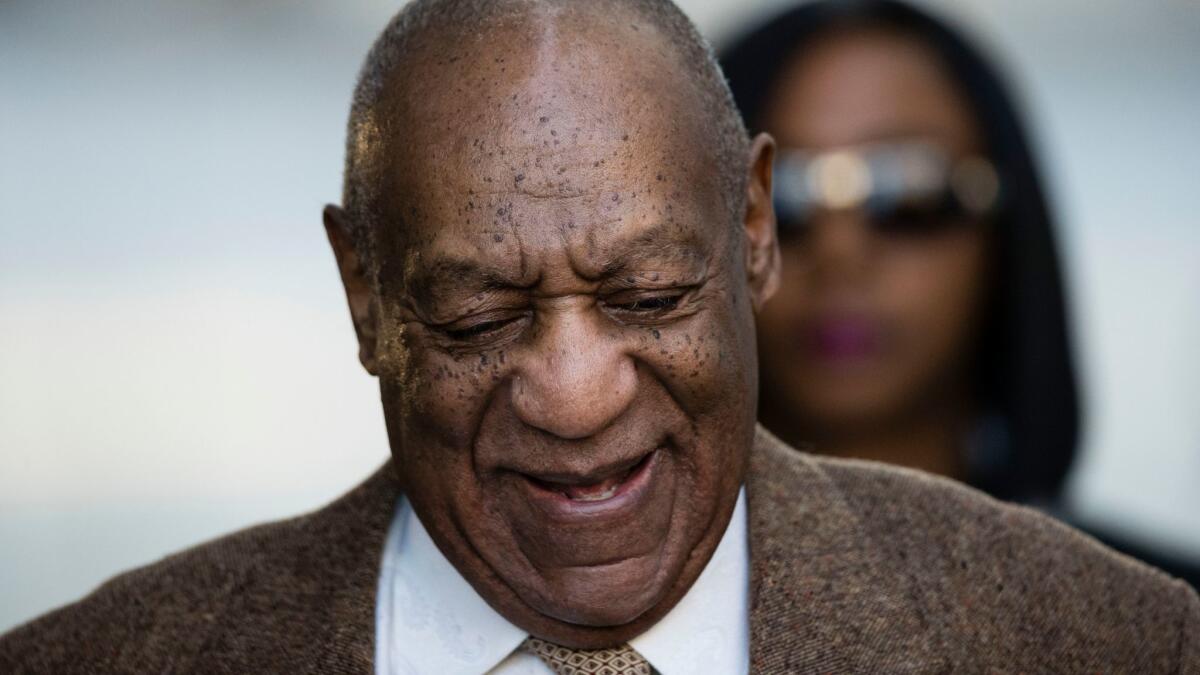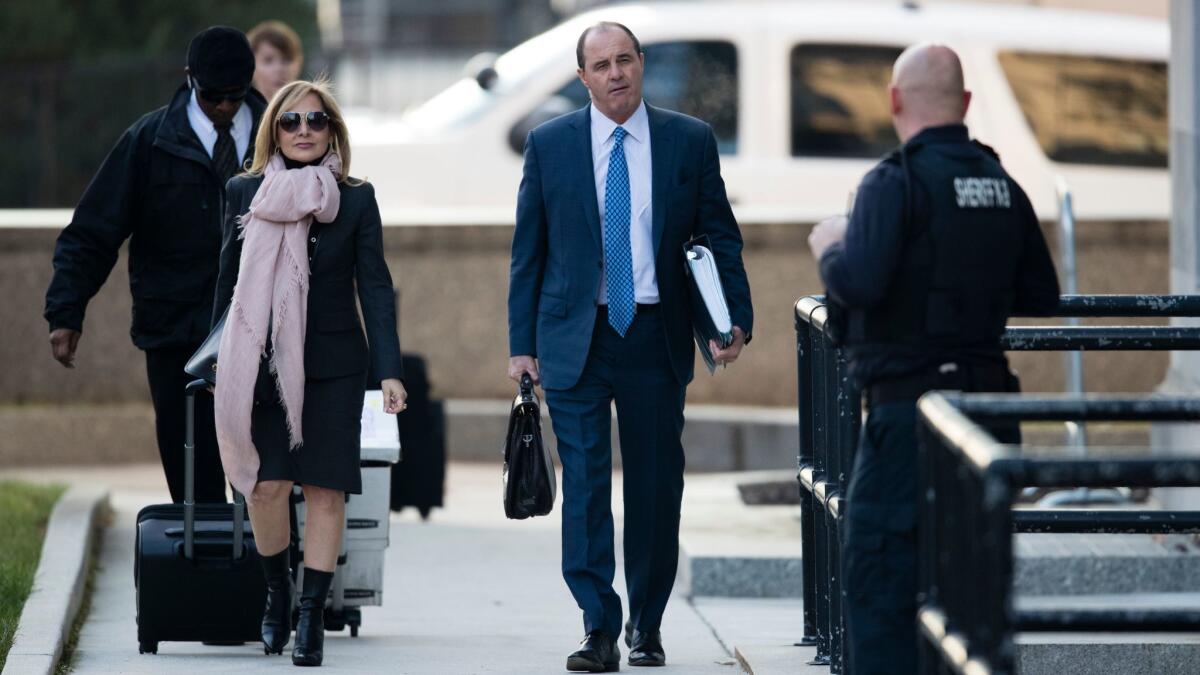Is Bill Cosby a pathological abuser or a target of opportunists? Lawyers battle

- Share via
Reporting from NORRISTOWN, Pa. — Did Bill Cosby devise a plan to drug and rape women and secretly carry it out over the course of decades in the public eye?
Or is he a popular entertainer being railroaded by opportunists with stale accusations and dubious motives?
Lawyers laid out dramatically competing views of the comedian in a Pennsylvania courtroom Wednesday, part of a high-stakes battle that puts the women’s right to testify and Cosby’s freedom on the line.
The arguments were part of a two-day hearing to determine whether 13 alleged victims can testify in Cosby’s upcoming trial involving another accuser, Andrea Constand. It ended Wednesday night without a ruling – the judge in the case, Steven T. O’Neill, suggested it could be weeks or even months before he handed down a decision.
But the intense volleying served as both a preview of that trial, set for the spring, and a platform for the victims’ rights and celebrity privilege issues that the Cosby case raises.
“This is a lifetime of sexual assault on young women,” Montgomery County Dist. Atty. Kevin Steele said at a pretrial hearing. “He’s doing things to instill trust in [victims], then exploiting that trust.”
Countered Cosby lawyer Brian McMonagle: “[This is] a bandaged bandwagon of claims that have been put together in Pandora’s box. And they were put in that box by some clever and cunning lawyers who had as their agenda the bringing down of an American icon.”
Cosby, in a brown jacket and white pocket square, sat mostly stoic, slung low in his seat as the details of his alleged extramarital encounters over five decades were recited at length. His sexual history is a crucial element to what activists say may be a final opportunity to bring the entertainer to justice. Many of the accusations against him that have surfaced have seen their statute of limitations expire.
Yet prosecutors here a year ago, just before a Dec. 31 deadline, arrested Cosby, charging him with three felony counts of indecent assault for a 2004 incident at Cosby’s Pennsylvania home in which he allegedly provided Constand, then a Temple University basketball employee, with a pill and then penetrated her with his fingers.
The 13 women are instrumental to Steele’s case in front of a jury; taken together, their stories present a pattern of alleged abuse that Constand’s account, which contains some inconsistencies, does not provide on its own.
See the most-read stories in Entertainment this hour »
But Pennsylvania law only allows testimony in unrelated cases if the prosecution can demonstrate a “common scheme” — in this case, that Cosby essentially had a modus operandi. So on Wednesday, prosecutors sought to weave common threads through the cases of the 13 women. Running through similarities in alleged incidents that date to 1969 and continued through the 1990s, Steele built a case for how Cosby, in the context of his work travels, met significantly younger women, befriended them and then invited them to an environment he controlled — a dressing room, a home or hotel — where he proceeded to drug and rape them.
This is “distinctively recognizable as the handiwork of the same perpetrator,” the prosecutor said. “The proof of one tends to establish the proof of another.”
McMonagle followed Steele by taking aim at the claims of the 13 women and their purported similarities to the Constand matter.

In the first part of his argument Wednesday morning, McMonagle noted that the 13 women’s allegations, which have been entered as court statements, simply stretch too far back and are too murkily detailed to have any place in a trial.
“Sometime in 1982, some house owned by somebody … somewhere in Reno,” McMonagle said, mocking Steele’s line of questioning. “‘Where were you that day, Mr. Cosby? We don’t need the day; we don’t need the month.’”
Defense attorneys then spent much of the afternoon going through the accusers’ stories, spending as much as half an hour on each with the help of a color-coded PowerPoint spreadsheet as McMonagle and co-counsel Angela Agrusa took turns at the podium.
The line of defense veered between calling into question the reliability of the 13 alleged victims — Where did this happen? Why did they take so long to come forward?— and drawing a contrast with the Constand matter.
For the purpose of Wednesday’s hearing, however, only the latter issue is pertinent.
Though many of the distinctions among the incidents described were decidedly minor — an accuser might be a high-school-educated aspiring model whereas Constand is a college-graduate world traveler — the defense argued that they were sufficiently different from the Constand case to disqualify the accusers from testifying at the trial, which is tentatively set for June.
Cosby’s lawyers described their client’s interactions with the women as entirely unrelated events; if they’re united, they said, it’s by a desire for publicity and money.
McMonagle said all 13 had come forward after the Constand headlines in 2005, many in the last two years when the allegations against the comedian became front-page news.
“Everybody got up the next day and the next day and the day after that, and there was a police station down the block,” he said. “It is no coincidence not one reported the [incidents] to law enforcement.”
Agrusa said that the common denominator in these cases wasn’t Cosby’s actions but the high-profile personality representing many of them in civil suits: Gloria Allred, the Los Angeles lawyer whose presence has hovered over the criminal proceedings.
“She’s an amazing marketer,” Agrusa said. “Her fingerprints are all over these accusations.”
Allred sat quietly in the back of the courtroom as her name came up repeatedly, occasionally smiling or shaking her head. At an impromptu news conference outside the courthouse later, she said, “Today there was a full-scale attack by the defense on victims. This is an old script line. I don’t think it will distract us.”
For his part, Steele said that if there were discrepancies in the women’s stories it was because Cosby created conditions that would make what happened hard to remember.
“They’re asking the court to reward him for the fuzziness in their story,” Steele said to the judge about the defense. “But you drug somebody, intoxicate them so they don’t remember, and he gets rewarded because they’re not exact in their explanations?”
While O’Neill had stressed that the credibility of the accusers would not be at issue, the defense frequently questioned the women’s behavior and past; in one case the attorneys even cited a felony conviction. The hearing offered a glimpse into how the accusers’ lives are likely to be in the foreground if they’re allowed to testify at the trial.
Still, the fight to bring them to the stand has become a cause celebre for feminist groups and their advocates, who say Cosby epitomizes how a man can use his privilege to abuse and exploit women.
The stakes are also more specific: Legal experts say that without the women’s testimony, a jury could well be unpersuaded to convict Cosby of assaulting Constand. The prosecution’s case contains a number of flaws, including time lapses in when the alleged victim came forward and the fact that, unlike some of the other accounts, the woman accepted a pill from Cosby.
Steele acknowledged the importance of the 13 women to his argument Wednesday. “The commonwealth [of Pennsylvania] has a significant need for this evidence,” he said. “Without [it], we’re forced to rely on what … will be argued as the uncorroborated testimony of the victim.”
McMonagle fired back that Steele was trying to use Constand as a Trojan horse. “Andrea Constand has never been the reason we’re here; Andrea Constand walked away from this case 11 years ago,” he said, referring to a civil settlement at the time. “This is a means to overcome a statute of limitations because somebody decided to bang the drum with an American citizen.”
Twitter: @ZeitchikLAT
ALSO
Prosecutors say Bill Cosby engaged in a pattern of sexually abusive behavior
Veterans came to North Dakota to protest a pipeline. But they also found healing and forgiveness
Stephen Bannon found inspiration in ancient thinkers, Ronald Reagan and Nazi propaganda
UPDATES:
5:10 p.m.: This article was updated with more quotes and details from the hearing.
1:10 p.m.: This article has been updated with Wednesday’s arguments.
This article was originally published at 10:25 a.m.
More to Read
Sign up for Essential California
The most important California stories and recommendations in your inbox every morning.
You may occasionally receive promotional content from the Los Angeles Times.











